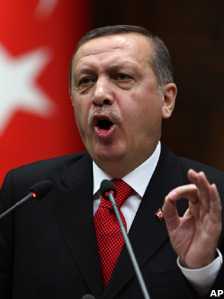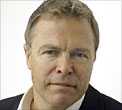 Since the very beginning of the Arab uprisings, over and over again we’ve been hearing politicians, commentators – almost everyone with an opinion – express the ardent hope that new Arab governments would emulate “the Turkish model,” a supposed moderate Islamic democracy.
Since the very beginning of the Arab uprisings, over and over again we’ve been hearing politicians, commentators – almost everyone with an opinion – express the ardent hope that new Arab governments would emulate “the Turkish model,” a supposed moderate Islamic democracy.
Well, think again. Lift the covers off this mythical wonderland, and you’ll find a cesspool, a government showing utter contempt for its own people by jailing scores of reporters, blocking thousands of websites, severely punishing anyone who dares utter a word of criticism.
Aren’t those the very same proclivities that drove so many angry Arabs into the street?
Guess which nation has jailed more reporters than any other. China? Iran? No, it’s Turkey. The Turkish media say 68 are in prison right now – double the number last reported in either China or Iran. And some are jailed for more than just a few days or weeks.
The International Press Institute noted that two newspaper reporters were recently sentenced to 138 and 166 years each. Another is battling 150 separate court cases. Two others, on trial now, face up to 3,000 years in prison. A common charge is “insulting the president of the republic.” If that were a legal charge in any actual democracy, the nation’s entire press corps would be in jail.
The nation’s prime minister, Recep Tayyip Erdogan, defends his treatment of the news media, averring last month that all those reporters are in trouble because of their “subversive activities.” None of them, he added “are being detained because of their activities as a journalist.” That’s utter nonsense.
Erdogan was referring indirectly to the so-called Ergenekon plot, a chimerical scheme to cause chaos that is intended to prompt the military to take control and install a fully secular government again.
In 2007, authorities found 27 hand grenades in the attic of an Istanbul slum home. From that, the government spun a rich web of conspiracy and intrigue that has allowed authorities to arrest hundreds of people, reporters and others, on charges of “subversive activities.” And yet, four years later we have seen no significant public manifestation of this so-called plot.
I am hardly the only one who views this as a weak pretext for eliminating freedom of the press and the right to free expression. National security “should not be used as a ground to curb media freedom,” said Dunja Mijatovic, press-freedom officer for the Organization for Security and Cooperation in Europe, which published a study this spring of Turkey’s assault on the press. She and others chastised Turkey for arresting reporters for simply reporting on the so-called Ergenekon plot.
In Turkey, “writing about sensitive issues, including issues of terrorism or anti-government activities, is often considered as supporting those issues,” her office said.
I’ve worked in dozens of authoritarian states that have little tolerance for the news media. But I have never before seen such a pervasive, indiscriminate assault on the media. “More than 2,000 journalists are being prosecuted, and investigations have been launched against 4,000 journalists,” the Turkish Policy Center in Washington reported.
The problem has grown so serious that, in April, Reporters Without Borders staged a conference in Istanbul and said “it’s worrying to note that all journalists are under threat.”
You expect this sort of behavior from elected government leaders who are not planning to leave office when their time is up. But Erdogan might have another motivation, too. Modern Turkey was founded as a fiercely secular state, and Erdogan is trying to give it a stronger Islamic flavor. Many Turks believe, as former Justice Minister Aysel Celikel once said, that the Ergenekon investigation “is being used as a tool to sweep across civil society and cleanse Turkey of all secular opponents.”
To that end, the government also blocks thousands of websites it considers insulting, offensive or otherwise uncomplimentary to itself. Human Rights Watch says Turkey was blocking 8,170 sites when it last checked in March. Among them were YouTube and some Google services. As many as 100,000 Turks protested this in nationwide rallies earlier this month.
Most people around the world know nothing of this, and the nation’s leaders count on that. President Abdullah Gul gave a speech in Indonesia last month in which he called his country a “shining” example for the Arab world, “a strong source of inspiration to the people in the region.
“Just being us,” he boasted, “we serve as a catalyst for reform.”
Weeks earlier, a court sentenced Turkish journalist Cem Buyukcakir to an 11-month jail term, suspended – for “insulting President Gul.”
© 2011 Joel Brinkley
Joel Brinkley, a Pulitzer Prize-winning former foreign correspondent for the New York Times, is the author of “Cambodia’s Curse: The Modern History of a Troubled Land.” Brinkley will speak at 5:30 p.m., Thursday at the World Affairs Council of Northern California, 312 Sutter St., San Francisco. To register, go to www.itsyourworld.org/assnfe/ev.asp?ID=2964&SnID=585865198. E-mail him at brinkley@foreign-matters.com. Contact The Chronicle at sfgate.com/chronicle/submission/#1.
This article appeared on page F – 5 of the San Francisco Chronicle
via Turkey wrong model for Arabs seeking freedom.


 I’m
I’m